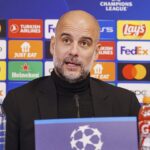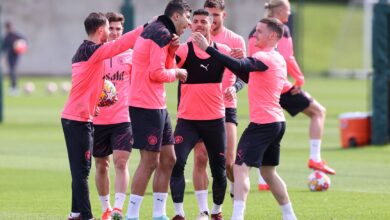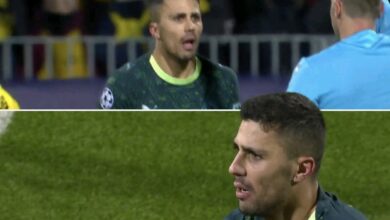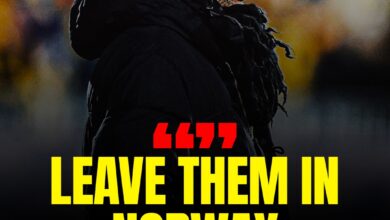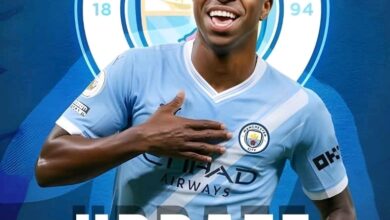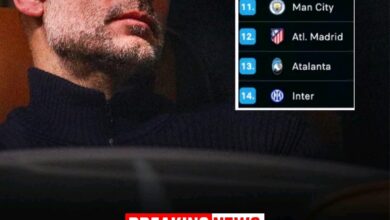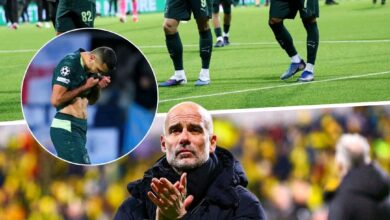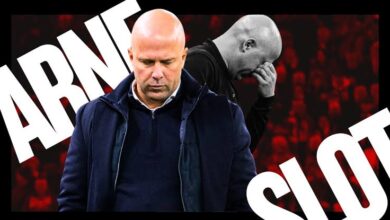Pep Guardiola ‘changes his mind’ on huge summer transfer and tells club to ‘stop negotiating’ as player ‘isn’t at the level’
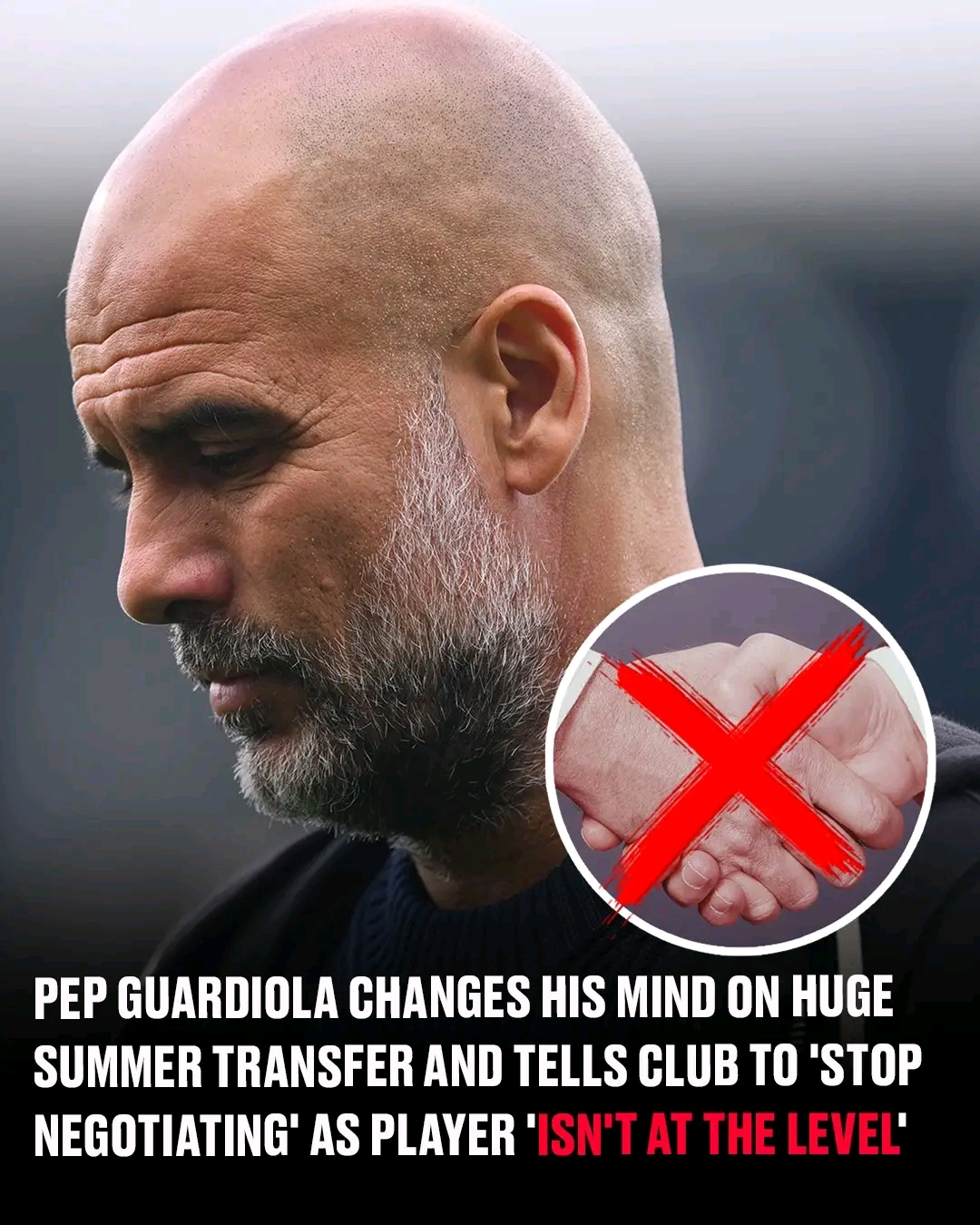
The summer transfer window has always been a period of intense speculation, strategic maneuvering, and high-stakes decision-making in the world of football. For Manchester City, a club that has redefined modern football under Pep Guardiola’s stewardship, this upcoming window promises to be particularly intriguing. Recent reports suggest that the Catalan tactician has made a significant about-face regarding a high-profile target, instructing the club’s hierarchy to cease negotiations for a player he now deems “not at the level” required for his ambitious project at the Etihad Stadium.
Manchester City’s 2024/25 campaign concluded on a somewhat disappointing note, marking the first time in recent memory that Guardiola’s side finished a domestic season without silverware. The Citizens found themselves in third place in the Premier League table, a position that would have been unthinkable during their dominant years under the Spanish manager. Perhaps more painfully, they suffered defeat in the FA Cup final against Crystal Palace, a result that left both fans and management questioning the squad’s current trajectory.
This trophy drought, while temporary in the grand scheme of Guardiola’s successful tenure, has nevertheless sparked serious introspection within the club’s corridors of power. The extended season format means City still has an opportunity to salvage silverware through the newly-formatted 32-team Club World Cup, but the domestic disappointments have clearly influenced the club’s approach to the upcoming transfer window.
The timing of these setbacks couldn’t be more significant, as they coincide with what many observers consider a natural transition period for the squad. Several key players are approaching the twilight of their careers, while others have struggled to maintain the consistently high standards that have become synonymous with Manchester City under Guardiola’s guidance
Understanding Guardiola’s recent transfer decision requires a deep appreciation of his philosophical approach to squad management. The 54-year-old manager has consistently emphasized quality over quantity throughout his illustrious career, from his revolutionary tenure at Barcelona through his successful spells at Bayern Munich and Manchester City.
In a revealing interview conducted in May, Guardiola articulated his stance with characteristic clarity and conviction: “I said to the club, I don’t want that. I don’t want to leave five or six players in the tribune. I don’t want that. I will quit. Make a shorter squad, I will stay. It’s impossible for my soul to give [leave] my players in the tribune, that they cannot play.”
This statement encapsulates Guardiola’s holistic approach to management, which extends far beyond tactical considerations to encompass the psychological and emotional well-being of his players. His reluctance to maintain a bloated squad stems from a genuine concern for player development and satisfaction, recognizing that talented individuals cannot reach their full potential without regular competitive action.
The January transfer window had already tested this philosophy, with Manchester City bringing in Omar Marmoush, Nico Gonzalez, Abdukodir Khusanov, Vitor Reis, and Juma Bah. While these acquisitions added depth and quality to the squad, they also increased competition for places and highlighted the delicate balance Guardiola must maintain between having sufficient options and ensuring everyone feels valued and utilized
The player in question, according to reports from Football 365, is Barcelona and Uruguay center-back Ronaldo Araujo. The 26-year-old defender had been linked with a potential move to Manchester City, with negotiations reportedly progressing to an advanced stage before Guardiola’s intervention.
Araujo’s profile would seem to fit many of City’s requirements on paper. A physically imposing center-back with excellent aerial ability, pace, and technical proficiency, the Uruguayan international has been a consistent performer for Barcelona over recent seasons. His versatility, allowing him to operate effectively in a back three or as part of a traditional defensive partnership, would theoretically provide Guardiola with tactical flexibility.
However, football at the highest level is rarely about theoretical suitability. Guardiola’s standards are notoriously exacting, shaped by years of working with world-class talents and achieving unprecedented success. His assessment that Araujo is “not at the level” suggests a gap between the player’s current abilities and the specific requirements of City’s system.
This decision reflects several key aspects of Guardiola’s evaluation process. Firstly, his intimate knowledge of Barcelona’s recent decline may have provided unique insights into Araujo’s performances and limitations that external observers might miss. Having spent formative years at the Catalan club and maintaining close connections within Spanish football, Guardiola possesses an insider’s perspective on player development and potential.
Secondly, the decision demonstrates Guardiola’s unwillingness to compromise on his standards, even when facing external pressure to strengthen the squad. The temptation to acquire a recognized international defender might be strong, particularly given City’s recent defensive vulnerabilities, but Guardiola’s track record suggests he would rather work with fewer options than integrate a player who doesn’t meet his exacting criteria.
Chairman Khaldoon Al Mubarak’s recent comments provide valuable context for understanding City’s broader transfer strategy. His admission that the club “probably should have been more aggressive in some of the changes we needed to do” last summer suggests a recognition that the current squad composition may not be optimal for sustained success.
Al Mubarak’s emphasis on being “very clear, very swift” in the upcoming window indicates a departure from the cautious approach that may have contributed to last season’s disappointments. The chairman’s revelation that the club has “clearly identified who exactly are the targets, in what positions” and has “clear number one option, our clear number two option” suggests extensive preparation and strategic planning.
This systematic approach aligns perfectly with Guardiola’s preference for working with a smaller, more cohesive squad. Rather than casting a wide net and hoping for the best, City appears committed to pursuing specific, high-quality targets who meet the manager’s exact specifications.
The Club World Cup represents an additional motivation for getting transfers completed efficiently. The tournament’s timing and format will require City to have their squad settled and integrated well before the competition begins, adding urgency to the summer’s activities.
With the Araujo move apparently off the table, attention naturally turns to City’s alternative options. The club has been linked with several high-profile midfield talents as potential successors to Kevin De Bruyne, including Morgan Gibbs-White, Florian Wirtz, and Rayan Cherki.
Florian Wirtz, in particular, represents the type of transformational signing that could define City’s next era. The young German midfielder has impressed consistently for Bayer Leverkusen and possesses the technical ability, vision, and work rate that Guardiola values highly. However, reports suggest Liverpool is currently leading the race for his signature, highlighting the competitive nature of the modern transfer market.
The pursuit of such players reflects City’s broader strategy of combining proven quality with emerging talent. This approach has served the club well historically, allowing them to maintain competitiveness while planning for the future.
One factor that may influence City’s transfer strategy is the anticipated return of Rodri, the 2024 Ballon d’Or winner who missed significant portions of the previous season through injury. The Spanish midfielder’s absence was keenly felt throughout City’s disappointing campaign, with the team struggling to maintain their characteristic control and rhythm without his presence in the engine room.
Rodri’s return effectively provides City with a new signing without the need for additional expenditure or squad integration. His unique combination of defensive solidity, passing range, and tactical intelligence makes him irreplaceable within Guardiola’s system, and his availability should significantly strengthen the team’s prospects for the upcoming season.
However, Rodri’s return also highlights the importance of getting other transfers right. With one key position effectively filled, City can focus their resources and attention on areas where improvement is most needed, ensuring that any new arrivals complement rather than compete with existing strengths.
The flip side of City’s transfer strategy involves managing potential departures. Jack Grealish, the club’s record signing, has been mentioned as a possible departure candidate, with suggestions that he may struggle to secure regular first-team football under Guardiola’s rotation system.
Grealish’s situation exemplifies the challenges facing modern football clubs operating at the highest level. Despite his undoubted talent and significant transfer fee, the English winger has found consistent starting opportunities limited by tactical considerations and competition from other attacking options.
Any decision regarding Grealish will likely influence City’s approach to other potential signings. His departure would free up significant wage budget and potentially create space for alternative attacking reinforcements, while his retention might limit options in other areas of the squad.
The broader question of squad harmony and player satisfaction remains central to Guardiola’s thinking. His comments about preferring to quit rather than leave players “in the tribune” reflect a genuine concern for maintaining positive team dynamics and ensuring all squad members feel valued and motivated.
Manchester City’s transfer activities take place within an increasingly complex regulatory environment, with Financial Fair Play rules and sustainability regulations influencing club decision-making processes. The Premier League’s Profit and Sustainability Rules, along with UEFA’s Financial Fair Play regulations, require clubs to balance their spending against revenue generation and long-term financial health.
These constraints may have played a role in Guardiola’s decision to halt negotiations for Araujo. Rather than pursuing a player who might not represent optimal value for money, City appears committed to identifying targets who offer the best possible return on investment in both sporting and financial terms.
The club’s recent commercial success, including new sponsorship deals and increased revenue streams, provides some flexibility in the transfer market. However, the need to balance books and maintain compliance with financial regulations means every major signing must be carefully justified and strategically sound.
Guardiola’s decision-making process inevitably reflects his ongoing tactical evolution and the specific requirements of his preferred systems. The Spanish manager has consistently adapted his approach throughout his career, refining formations, player roles, and strategic emphases based on available personnel and competitive circumstances.
City’s recent struggles may have prompted Guardiola to reconsider certain tactical approaches, potentially influencing the type of players he now prioritizes. The decision to abandon pursuit of Araujo might reflect a shift in defensive strategy or a preference for different player profiles within his evolving system.
The manager’s commitment to possession-based football, high pressing, and positional flexibility requires players with specific technical and intellectual attributes. Physical prowess alone, regardless of how impressive, may not suffice if a player cannot adapt to the cognitive demands of Guardiola’s approach
As Manchester City prepares for what promises to be a crucial summer transfer window, Guardiola’s decisive intervention regarding Ronaldo Araujo provides valuable insights into the club’s priorities and standards. The manager’s willingness to halt negotiations for a player he deems insufficient demonstrates the uncompromising approach that has defined his successful career.
The coming weeks will reveal whether City can successfully identify and secure their primary targets while maintaining squad harmony and financial sustainability. The challenge of competing with other elite clubs for the world’s best talent requires not only financial resources but also clear vision, effective planning, and decisive execution.
Guardiola’s track record suggests that his judgment, while occasionally controversial, typically proves sound in the longer term. His ability to identify players who can thrive within his specific tactical framework has been crucial to City’s sustained success, and his current caution may ultimately benefit the club’s competitive prospects.
The upcoming Club World Cup adds another dimension to City’s preparations, requiring the squad to be ready for high-level competition earlier than usual. This timeline pressure may influence the urgency with which transfers are completed and the integration process for new arrivals.
Pep Guardiola’s decision to instruct Manchester City to cease negotiations for Ronaldo Araujo encapsulates the uncompromising standards that have defined his managerial career. Rather than settling for a player who doesn’t meet his exact specifications, the Catalan tactician has demonstrated his commitment to maintaining the highest possible standards within his squad.
This approach, while potentially controversial in the short term, reflects the strategic thinking that has brought unprecedented success to Manchester City. Guardiola’s preference for working with a smaller group of players who fully understand and can execute his tactical vision has consistently delivered results at the highest level of the game.
As City prepares for a crucial summer transfer window, Guardiola’s intervention serves as a reminder that success at elite level requires more than just accumulating talented individuals. The integration of new signings into existing systems, the maintenance of squad harmony, and the preservation of tactical coherence all require careful consideration and decisive leadership.
The challenge now facing Manchester City is to identify and secure players who meet Guardiola’s exacting standards while addressing the squad’s competitive needs. The success or failure of this summer’s transfer activities may well determine whether City can return to their dominant form or face continued challenges in pursuit of major honors.
Ultimately, Guardiola’s decision represents a calculated risk based on his extensive experience and proven track record. While fans and observers may question the wisdom of abandoning potentially valuable signings, the manager’s history suggests that his judgment, while occasionally surprising, typically serves the club’s long-term interests. The upcoming season will provide the ultimate test of whether this approach continues to deliver the success that has become synonymous with Pep Guardiola’s Manchester City.


